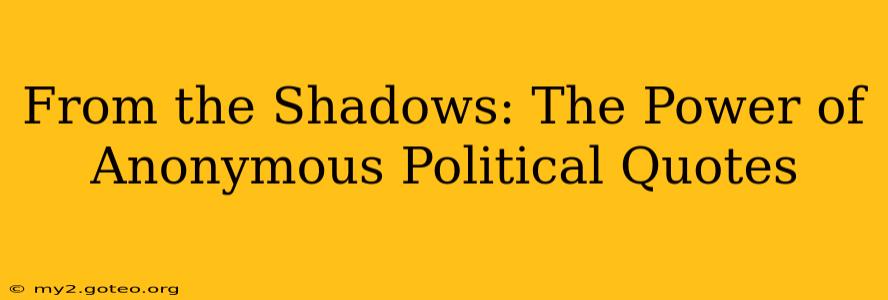Anonymous political quotes—those enigmatic pronouncements without a named source—hold a peculiar power in the political landscape. They resonate deeply, often more so than attributed statements, leaving a lasting impact on public discourse and shaping political narratives. But why? What is it about these shadowy pronouncements that captures our attention and influences our opinions? This exploration delves into the reasons behind their enduring power and the impact they have on political strategy and public perception.
Why Are Anonymous Political Quotes So Effective?
The effectiveness of anonymous political quotes stems from a confluence of factors that play on human psychology and the inherent nature of political communication.
-
Intrigue and Mystery: The lack of attribution immediately sparks curiosity. We are inherently drawn to the unknown, and an anonymous quote hints at a hidden source, potentially someone powerful or influential who wishes to remain unseen. This mystery adds weight and significance to the statement itself.
-
Perceived Authenticity: Paradoxically, the anonymity can lend an air of authenticity. Without the potential bias or perceived self-interest of a named individual, the quote can appear more objective and trustworthy. It's presented as a detached observation, free from political maneuvering.
-
Amplified Impact: The lack of a specific source broadens the potential impact. The quote isn't tied to a single individual's reputation or credibility. Instead, it can be interpreted and shared widely, potentially resonating with diverse audiences and shaping collective opinion.
-
Strategic Use in Political Campaigns: Anonymity provides a powerful tool for disseminating potentially damaging information about opponents without directly taking responsibility. It allows for the spreading of rumors or allegations while maintaining plausible deniability.
-
Protection of Sources: In contexts where revealing a source might lead to retribution, anonymity serves as crucial protection for whistleblowers or individuals revealing sensitive information. This is especially critical in authoritarian regimes or situations where speaking truth to power carries significant risk.
How Do Anonymous Quotes Shape Political Narratives?
Anonymous quotes can significantly impact the narrative surrounding political events and figures. They can:
-
Frame the Debate: A strategically placed anonymous quote can shift the focus of a political debate, setting the agenda and influencing the questions being asked.
-
Undermine Credibility: An anonymous quote alleging misconduct or incompetence can undermine the credibility of a political figure or institution, even without concrete proof.
-
Create Uncertainty: The ambiguity surrounding the source of the quote can sow doubt and uncertainty, making it harder to counter the claims being made.
-
Influence Public Opinion: Repeated dissemination of an impactful anonymous quote can gradually shift public opinion, creating a perception of widespread belief in the statement's validity.
What Are the Ethical Considerations of Using Anonymous Political Quotes?
While the use of anonymous quotes can be effective, it also raises ethical concerns:
-
Lack of Accountability: The absence of attribution makes it difficult to verify the quote's accuracy or challenge its source. This lack of accountability can lead to the spread of misinformation and false accusations.
-
Potential for Manipulation: Anonymous quotes can be easily manipulated and used for malicious purposes, such as spreading propaganda or damaging reputations.
-
Erosion of Trust: The overuse of anonymous quotes can erode public trust in political discourse and media, making it harder to distinguish credible information from disinformation.
Are Anonymous Quotes Always Negative?
Not all anonymous quotes are used for nefarious purposes. Sometimes, they provide valuable insights or criticisms without jeopardizing the source's safety or career. They can serve as a barometer of public sentiment, reflecting unspoken concerns or widespread opinions.
How Can We Critically Evaluate Anonymous Political Quotes?
It's crucial to approach anonymous political quotes with a healthy dose of skepticism. Consider the following:
-
Source Reliability: While impossible to identify the precise origin, consider the context in which the quote appeared. Is it from a generally reputable source?
-
Internal Consistency: Does the quote align with other known facts and information?
-
Motivations: What are the potential motivations behind disseminating the quote? Is it designed to influence a particular outcome?
-
Contextual Analysis: How does the quote fit into the broader political landscape? Does it align with existing power dynamics and narratives?
In conclusion, the power of anonymous political quotes lies in their ability to tap into our inherent curiosity and desire for truth. While they can be a powerful tool for shaping political narratives and influencing public opinion, their ethical implications must be carefully considered. By employing critical thinking and examining the context surrounding such pronouncements, we can better understand their impact and navigate the complex world of political communication.

